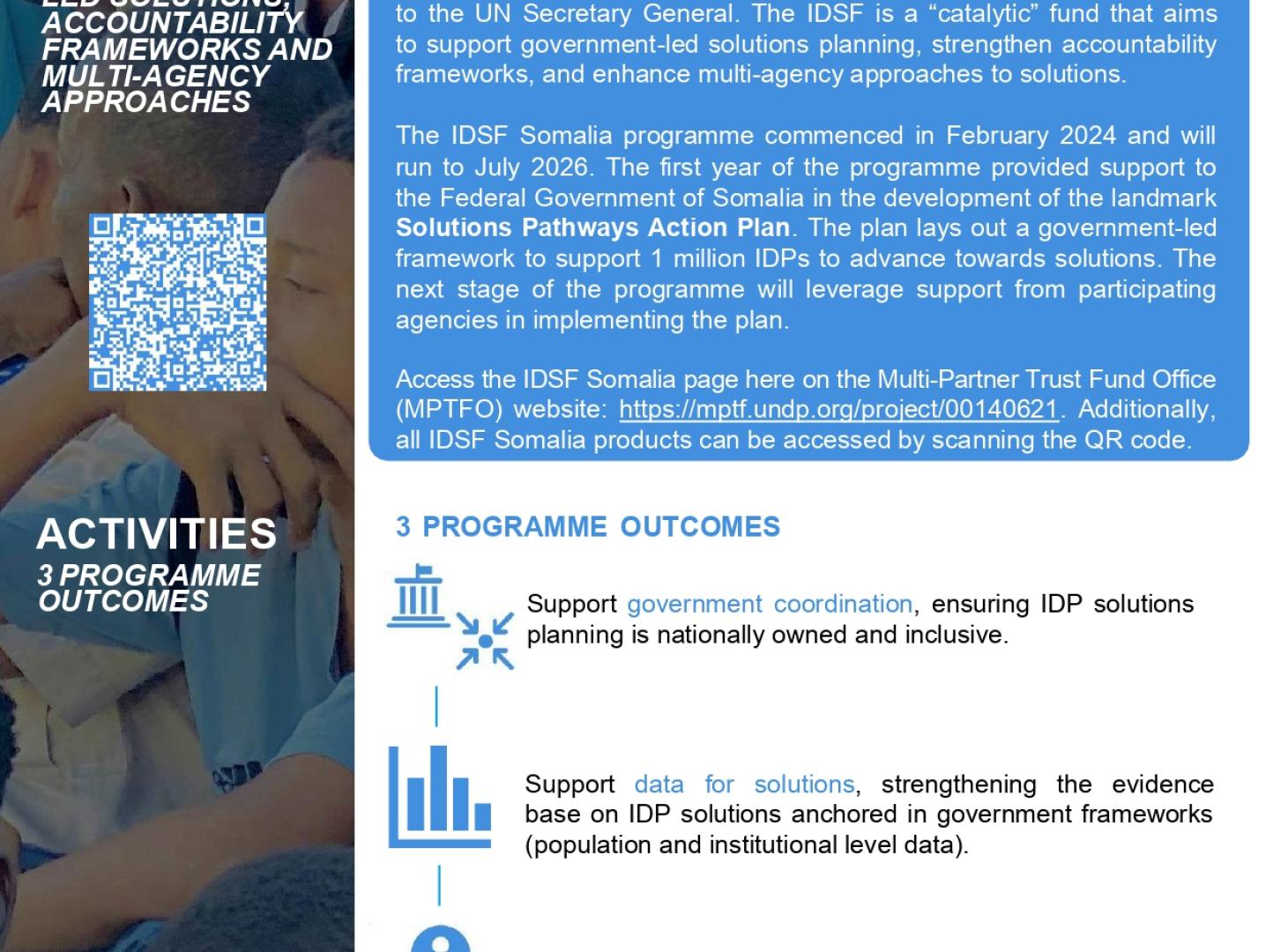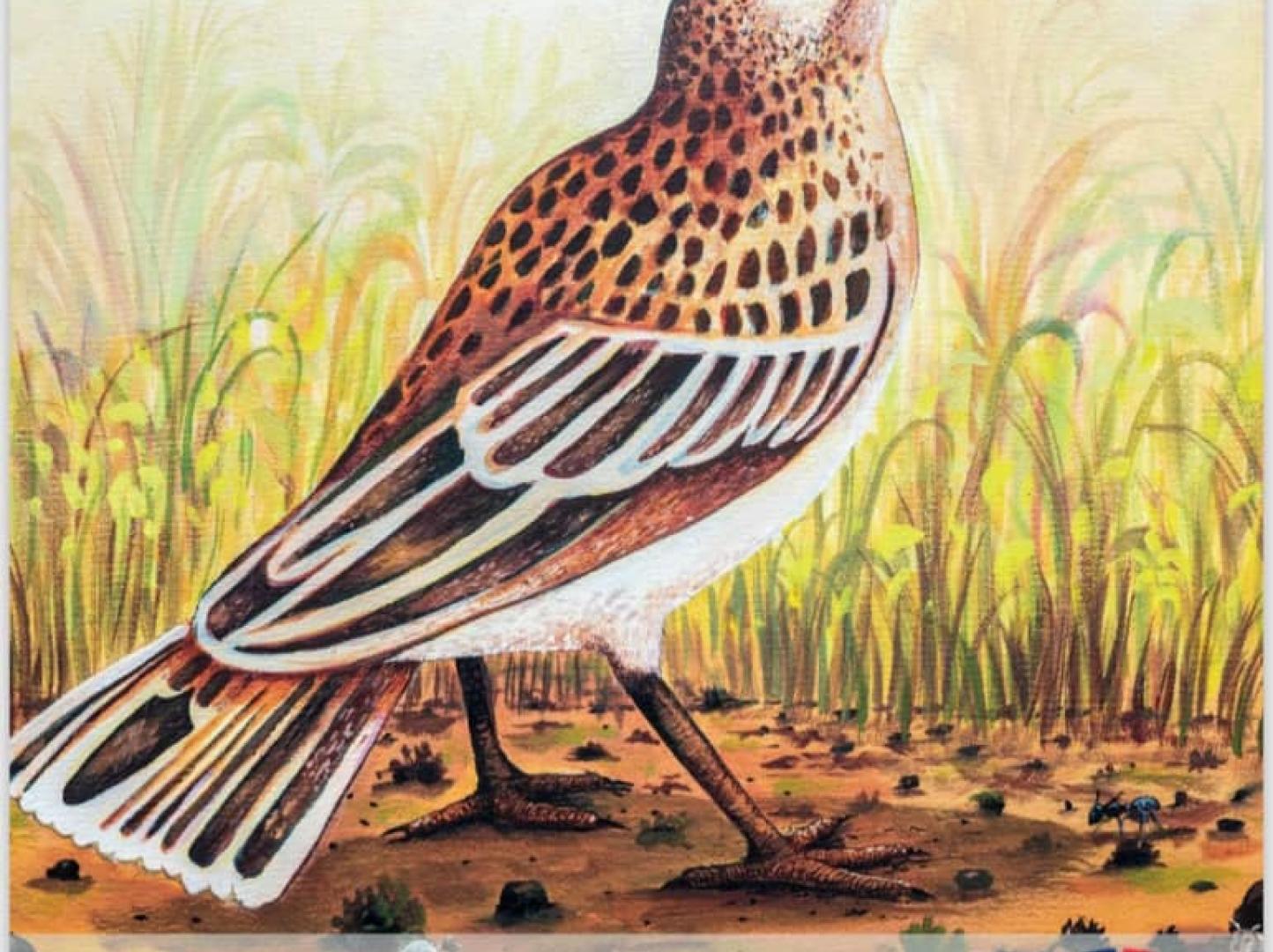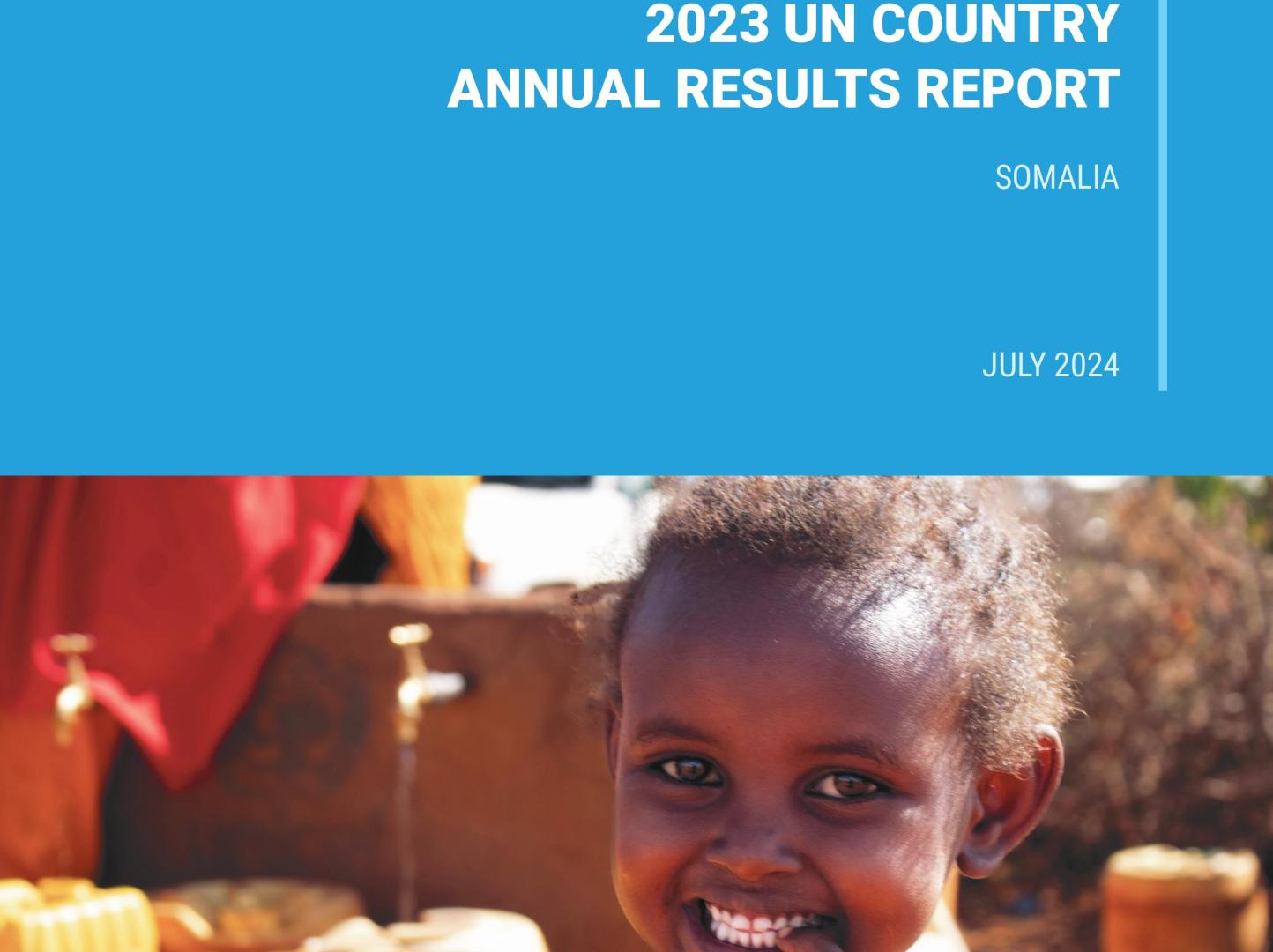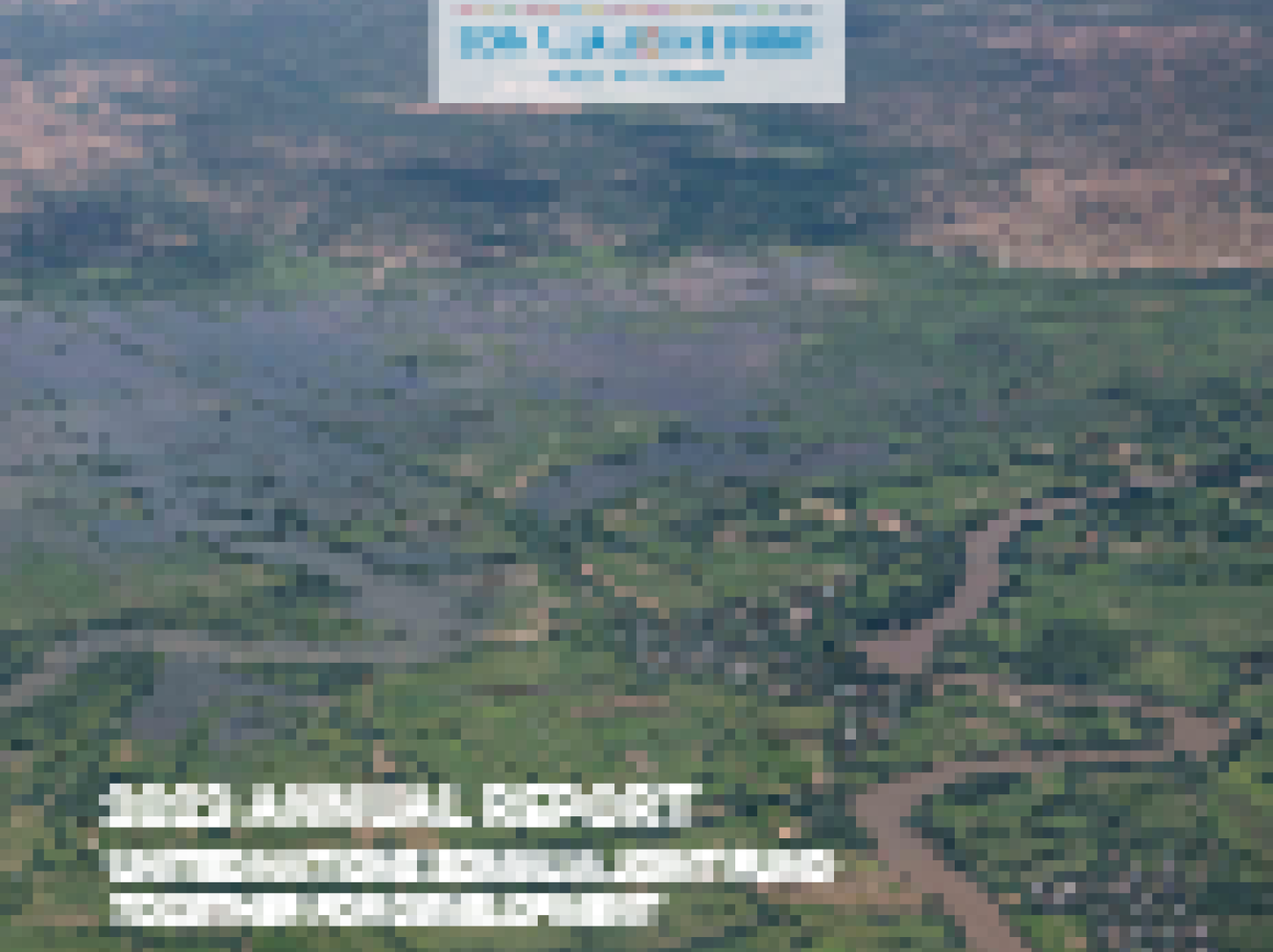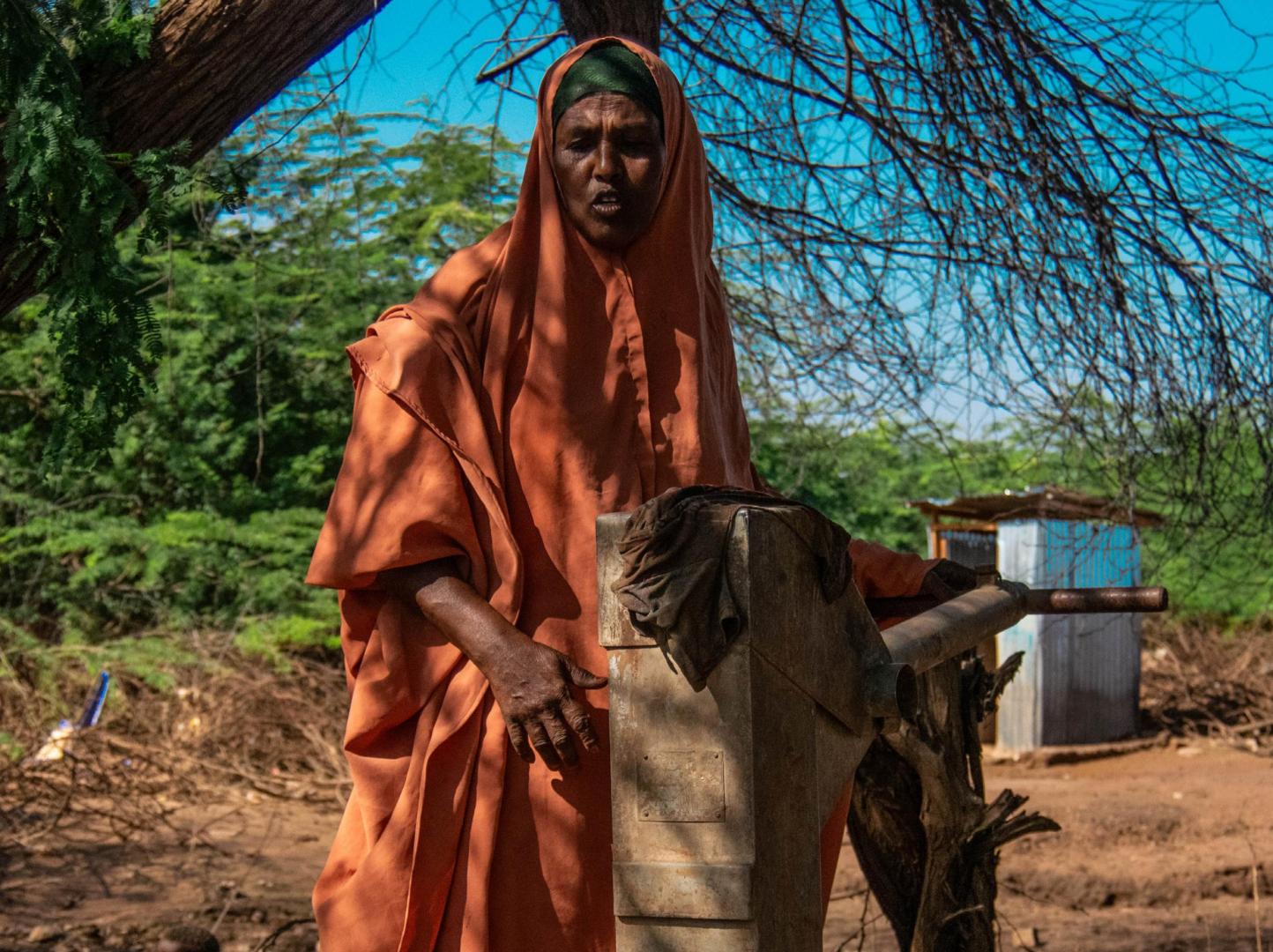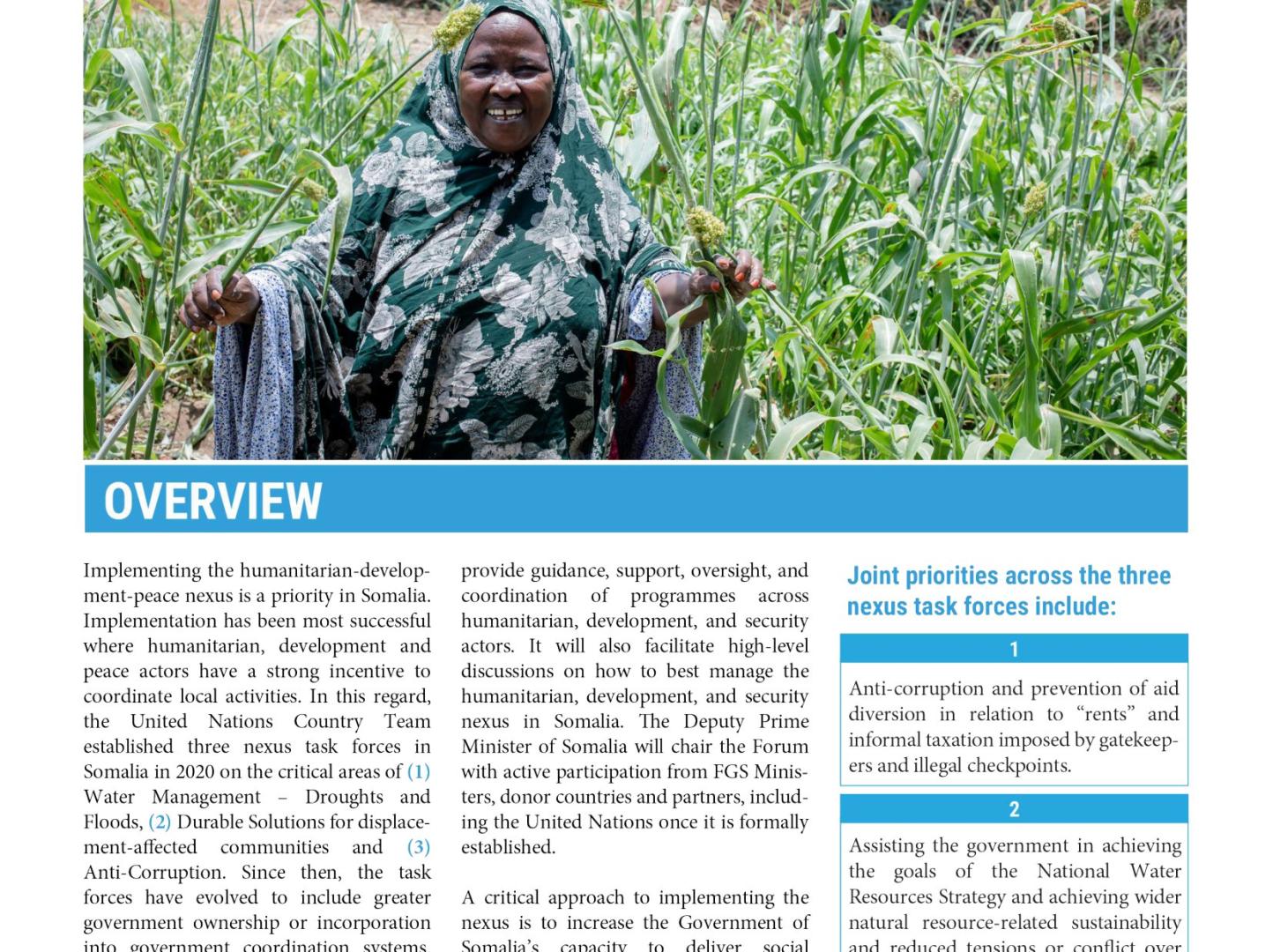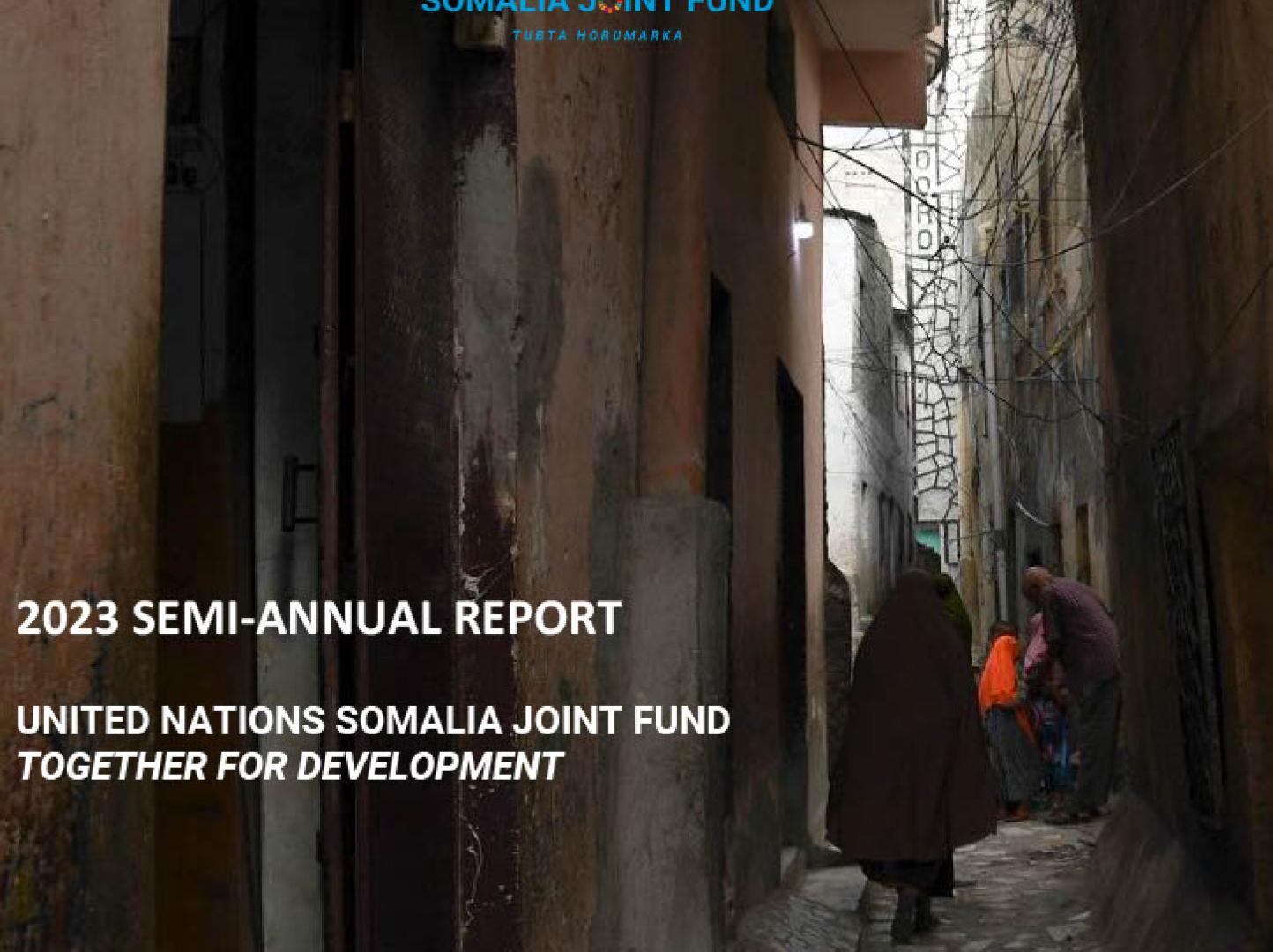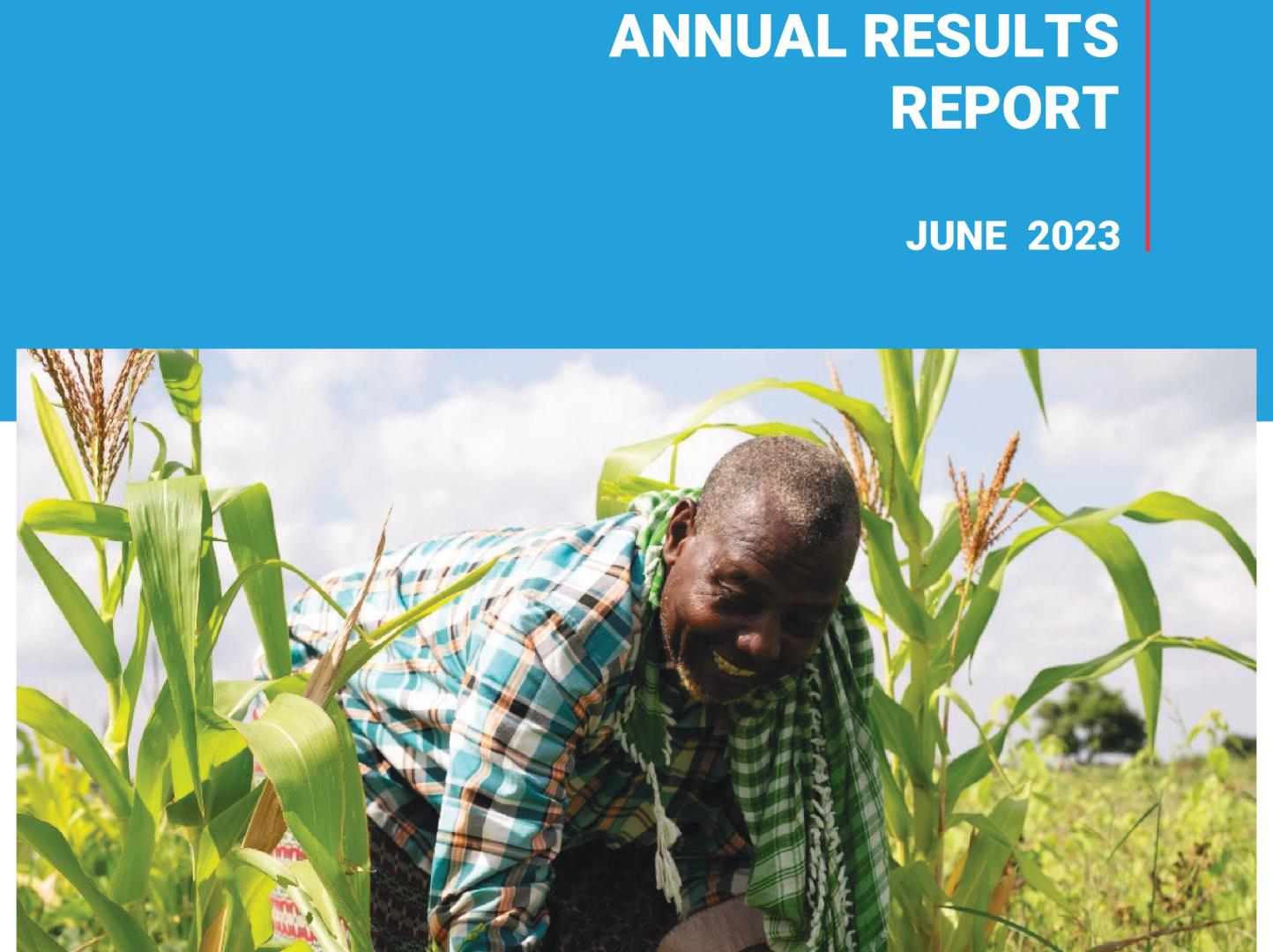Latest
Press Release
24 February 2026
Somalia’s humanitarian crisis worsening with 6.5 million people facing high levels of hunger
Learn more
Story
31 January 2026
A round-up of activities of the UN system in Somalia in January 2026
Learn more
Press Release
26 January 2026
Humanitarian partners seek US$852 million to assist 2.4 million people in 2026
Learn more
Latest
The Sustainable Development Goals in Somalia
The Sustainable Development Goals are a global call to action to end poverty, protect the earth’s environment and climate, and ensure that people everywhere can enjoy peace and prosperity. These are the goals the UN is working on in Somalia:
Story
19 November 2024
Irrigation project pour forth for displaced Somalis in Baidoa
Baidoa – Aden Sheikh Issack has a small allotment on an eight-acre communal farm in Barwaqo, a small settlement of internally displaced people (IDPs) on the outskirts of Baidoa in Somalia’s Bay region. He fled there when the conflict and hunger in his former residential area became too much to bear.At first, it was not easy surviving as a displaced person with large family but – with some external assistance – the farm has become productive and allows him to look after his wife and 11 children, as well as sell extra produce to local markets.The 50-year-old was proud to show off his farm recently to visit from the Somalia Joint Fund (SJF) – a multi-donor fund supporting Somalia’s development priorities. The visitors included representatives of the Somali government and the United Nations, and they had come to see firsthand the impact of the irrigation project which has ramped up the farmer’s output of maize, sugarcane and vegetables.“The irrigation project has been very beneficial, and we are already seeing its positive impact. I have been a beneficiary of this project since 2019 and I see better days ahead,” said Mr. Issack during the delegation’s recent visit to Barwaqo.Like Mr. Issack’s family, many local households have benefitted from the SJF’s Saameynta (transl.: ‘impact’) Programme – an eight-acre solar-powered, micro-irrigation drip serviced by a communal borehole, and set up to assist IDPs on land provided by the government.“This farm supports 57 families, with the smallest family having six members. This means we are talking about a minimum of 340 people. The total number is around 400 to 500 people and, out of the 57 families, 43 are led by women, including single mothers,” said the Director of Coordination and Monitoring in the federal government of Somalia’s Ministry of Planning, Mahamud Sicid Nur, told the visiting delegation.The four-year project will directly support 25,000 households and indirectly assist 150,000 people in South West State and Puntland, in the country’s north, by the end of 2025. International supportThe Saameynta Programme aims to provide durable solutions and scale up investments in mixed-use land development packages through drip irrigation, infrastructure improvement and small-scale business expansion. It is jointly implemented by the UN Development Programme (UNDP), the International Organisation for Migration (IOM) and the UN Human Settlements Programme (UN-Habitat), with funding provided through the SJF.According to the SJF’s manager, Peter Nordstrom, Saameynta has made important contributions to improving the economic status of displaced families. “The benefits of drip irrigation in arid or semi-arid environments are evident and its potential for creating sustainable livelihoods for communities is significant,” Mr. Nordstrom said.“At the same time,” he added, “access to land is at the heart of durable solutions for Somalia’s displacement crisis. Here in Barwaqo, the municipality has generously provided the land used for this communal farm but it is only serving a small portion of the IDP population.” Local authorities are keen to expand the project after having experienced its benefits.“In the past, we used to space the crops by about two metres when planting, but now we only space by 10 centimetres due to drip irrigation. This approach is new to us, and we are really impressed by the increased production,” Mr. Isaack told the visiting delegation.“Drip irrigation has also reduced our harvest times,” he continued. “We used to wait three months to harvest, but now we can harvest in just 15 days.”The trip was the SJF’s first joint UN-government monitoring mission, giving participants a firsthand look at the progress of ongoing programmes in the region. It was designed to explore synergies and to strengthen linkages within the SJF portfolio on the ground so as to facilitate more effective monitoring, foster learning and maximize impact through strategic collaboration and coordination between among the Federal Government of Somalia, local authorities and the United Nations.The visit also served as a platform for engaging directly with local authorities and community members.“Previously, displaced persons used to depend on aid, but now they have transitioned into farmers, producing their own food,” said the South West State’s Minister of Planning, Economic Development and International Cooperation, Hussein Mohamud Sheikh Hussein. “They are now food secure and sell any surplus to earn income,” he added. “This shows that we are gradually shifting from food dependency to self-sufficient farmers.”Critical funds Launched in 2023, the SJF is a multi-donor trust fund backed by Canada, Norway, Netherlands, Sweden, Switzerland and the European Union. It aims to strengthen partnership between the Somali Government, the United Nations and international partners in support of Somalia’s national development priorities and the achievement of the Sustainable Development Goals. Country-level pooled funds like the SJF are critical for the United Nations’ ability to better support development aspirations of the countries it operates in through the provision of the necessary flexibility to respond to complex challenges facing Somalia and to maximize synergies across the UN system through joint action.Originally established in 2014 and formerly known as Somalia Multi-Partner Trust Fund, the SJF is also one of the largest country-level development funds globally with more than $500 million in contributions since inception.
1 of 3
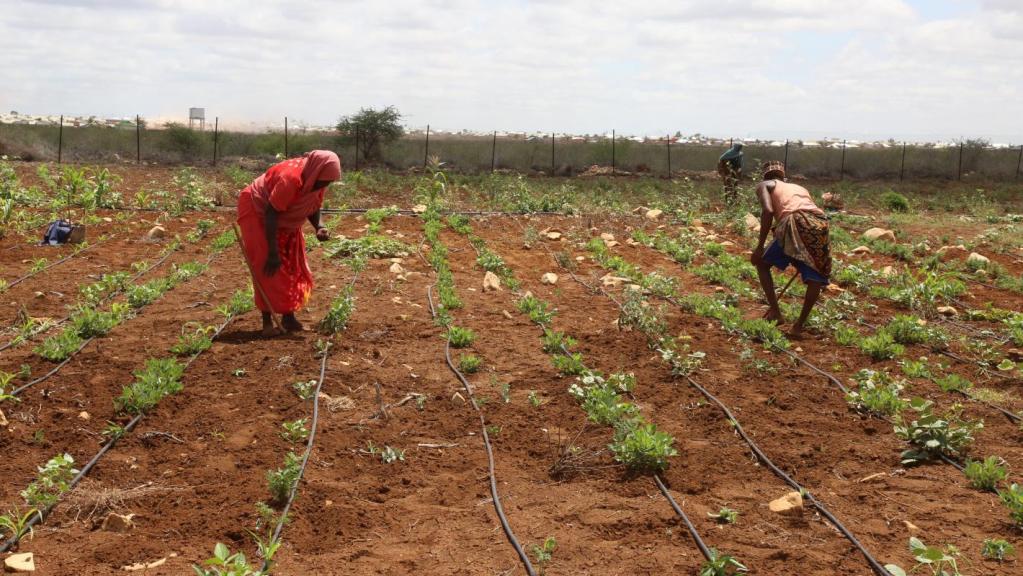
Press Release
02 July 2024
Federal Government of Somalia and United Nations convene the 2024 meeting of the Joint Steering Committee of the UN Cooperation Framework for Somalia (2021-2025)
The meeting of the Joint Steering Committee was co-chaired by the Minister for Planning, Investment and Economic Development, His Excellency, Mohamud A. Sheikh Farah (Beenebeene) and the UN Deputy Special Representative of the Secretary-General, Resident and Humanitarian Coordinator for Somalia, Mr. George Conway. His Excellency. Mohamud A. Sheikh Farah (Beenebeene) acknowledged the significance of the partnership in support of Somalia’s development priorities. “The Cooperation Framework is a testament to our strong partnership with the UN, driving forward our national development agenda and the Sustainable Development Goals (SDGs). We are committed to ensuring that the progress we make together translates into tangible improvements in the lives of the Somali people,” said, Minister, Mohamud.Speaking during the event, Mr. George Conway explained the annual Joint Steering Committee for the UN Cooperation Framework provides a platform to take stock and recalibrate our engagement to ensure alignment with the vision and aspirations of the country.“Five-year plans such as the UN Cooperation Framework are important to hold us accountable to commitments made. Under leadership of His Excellency the President, Somalia is conceiving a centennial Vision 2060 that seeks to capture Somali aspirations for their country. Providing a longer-term vision to guide short- and medium-term efforts will be helpful both in the finalization of the next National Transformation Plan as well as our next UN Cooperation Framework," said, Mr. Conway. The UN Sustainable Development Cooperation Framework (2021-2025) is the UN's multi-year strategic plan to guide the UN’s collective contribution to the realization of the 2030 Agenda for Sustainable Development and the Sustainable Development Goals in Somalia.—————————————————————————————————— FOR MEDIA INQUIRES: Communication Unit Department, Ministry of Planning, Investment and Economic Development | Email: Info@mop.gov.so Abdilatif Adan, Communications Specialist, UN Resident Coordinator Office in Somalia | Phone: +252614125028 | Email: abdilatif.adan@un.org | https://somalia.un.org/en |
1 of 3
Story
21 December 2021
Somalia is on the path of recovery, but real challenges remain
I arrived in Somalia in September 2019, two decades after having worked here previously. I knew that I was taking up a challenging assignment, but I was also looking forward to seeing Somalia’s progress. Afflicted by decades of conflict, recurrent climatic shocks, disease outbreaks and poverty, Somalia was often called a ‘failed state.’ The narrative is now changing, and although fragile, Somalia is on a path to stability and the resilience of the Somali people is second to none. That said, we are not under any illusion: significant challenges remain, and we must work even harder to preserve the gains made to date. Somalia’s upward trajectory is evident in the construction boom, as one analyst noted -- the sound of the hammer is replacing the sound of gunfire in Somalia’s capital.
The UN has been closely supporting the Somali people since the birth of the Republic in 1960. Currently, the UN's various mandates are implemented through 26 Agencies, Funds and Programmes (both resident and non-resident), one political mission (UNSOM) and one logistical support mission (UNSOS). The UN’s commitment towards the Somali cause is articulated in detail in the UN Sustainable Development Cooperation Framework (UNSDCF 2021-2025), mirroring the priorities of Somalia’s Ninth National Development Plan (NDP-9).
At the height of the COVID-19 pandemic, the UN marshalled support to help the Somali government respond to the virus outbreak. We continue to support the Somali authorities in seeking to defeat this pandemic and encouraging people to get vaccinated. Elections are also on-going in Somalia. The UN is supporting the process to ensure that elections are held in a peaceful and transparent manner, while at the same time advocating for 30 per cent women’s quota in the Somali legislature.
While these are encouraging signs of progress, we must not forget Somalia’s long-standing challenges. According to UN’s projections for next year, an estimated 7.7 million Somalis (nearly half of the country’s population) will require humanitarian assistance and protection. Women and children continue to bear the brunt of Somalia’s complex humanitarian crises, especially among the internally displaced communities. In light of the current serious droughts, the Somali government declared a humanitarian state of emergency on 23 November. Yet, neither the government nor the humanitarian community has adequate resources to respond. With a few days remaining in the year, the 2021 Humanitarian Response Plan which seeks US$1.09 billion remains only 70 per cent funded. Additional resources are urgently needed to prevent the dire humanitarian situation from becoming a catastrophe, so we continue to engage partners on this subject. In this regard, I undertook missions to Europe in October and to the Gulf in September. Throughout my interactions with partners, I stressed the need for additional funding to address Somalia’s escalating humanitarian crisis and elaborated on how inaction not only risks a reversal of the gains but puts the lives of millions of Somalis in jeopardy.
Through my field visits in Somalia, I have also seen first-hand the grim realities of adverse climate conditions. Somalia is no doubt on the frontline of climate change. The recurrent droughts and floods are driving widespread displacement, rapid urbanization, hunger, malnutrition and poverty. Climate change is also increasingly seen as the driver of conflict and a threat to the country’s security as the struggle over meagre resources deepens divisions. In addition, the loss of traditional livelihoods makes people vulnerable to recruitment by armed groups such as Al-Shabaab. Somalia is currently experiencing a third consecutive season of below-average rainfall, with nearly 80 per cent of the country experiencing drought conditions, water shortages and livestock deaths. One in five Somalis does not have enough water to cover his/her basic needs. On a positive note, as part of the efforts to mitigate the climate emergency, the government, with the support of the United Nations, has recently adopted an ambitious Nationally Determined Contribution to achieve global climate targets, in which Somalia committed to reduce its greenhouse gas emissions by 30 per cent by 2030.
Somalia’s crises are multifaceted, and they require comprehensive solutions from all stakeholders. It is our collective responsibility to support the efforts of the Somali people to cope with these crises and find lasting solutions that build resilience against future shocks. We must not fail the people we pledged to serve.
Adam Abdelmoula, Deputy Special Representative of the UN Secretary-General, Resident and Humanitarian Coordinator for Somalia, held a press conference on Monday, 20 December on the situation in Somalia, where the UN and partners is launching a nearly $1.5 billion Humanitarian Response Plan (HRP). Roughly 7.7 million people in the country will need assistance and protection in 2022, a 30 per cent rise in just one year.
Written by Adam Abdelmoula, Deputy Special Representative of the UN Secretary-General, Resident and Humanitarian Coordinator for Somalia
1 of 3
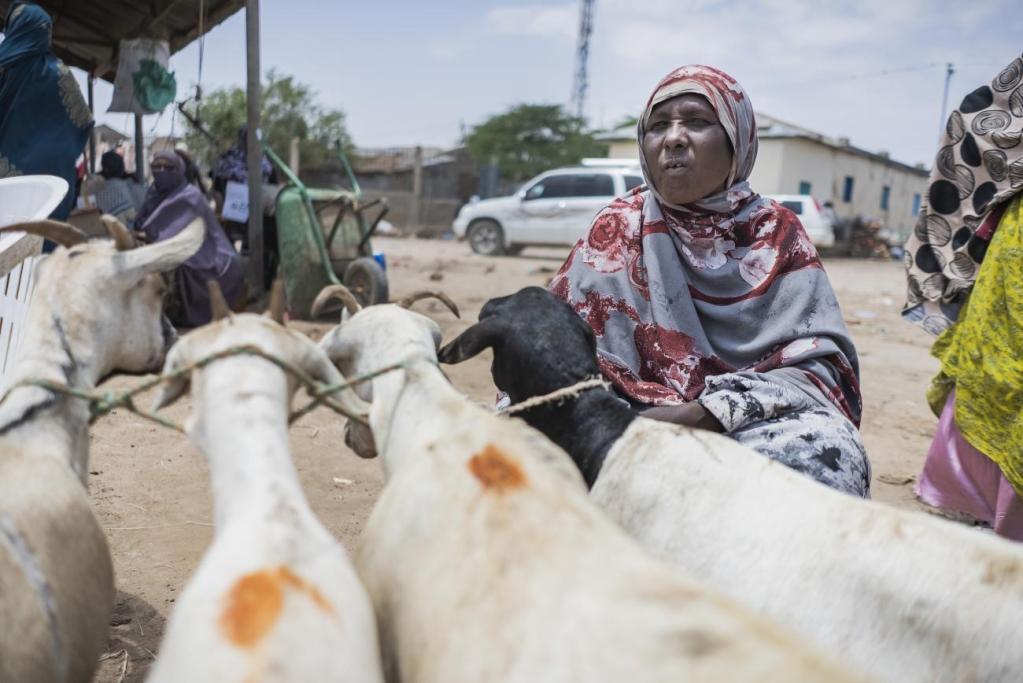
Story
31 January 2026
A round-up of activities of the UN system in Somalia in January 2026
Security| Strengthening Policing Institutions for a Safer SomaliaIn 2025, Somalia recorded an improved civilian-police ties, promoted a more preventive approach to safety and strengthened institutional accountability by establishing 10 Local Police Partnership Boards nationwide and empowering nearly 3,000 police officers and community members across the country through enhanced training and support.This was observed by a joint meeting of the Government and UNDP that reviewed the progress made through the Joint Police Programme Phase II (JPP II) in 2025. Anchored in Somalia’s New Policing Model and supported by the European Union and the United Kingdom, JPP II is strengthening professionalism, promoting human rights and gender equality, and rebuilding civilian-police ties. As the programme enters its final year, these achievements were approved by the JPP Steering Committee meeting, which also endorsed the 2026 plan to further expand the ongoing training and capacity enhancement activities.Click here for more. Health | WHO supports training of frontline health workersIn health facilities across Somalia, frontline health workers confront the same painful reality every day: children arriving too late, dangerously thin, and already fighting for survival. “The main goal of this training is to build the capacity of frontline health workers and nutrition programme managers to effectively implement the 2025 Somali Integrated Management of Acute Malnutrition (IMAM) guideline,” said Dr Aweis Olow Hassan, Nutrition Officer at WHO Somalia. Unlike previous versions, the revised guideline goes beyond treatment alone. It emphasizes prevention, expands care for infants under 6 months who are at risk of poor growth and development, and includes guidance for their mothers and caregivers.Click here for more. Empowerment| UNHCR supports refugee education In Banadir, UNHCR and partners marked a significant milestone with the graduation of 50 refugee students from a Technical and Vocational Education and Training program, in January. Centred on women’s and youth empowerment, the initiative transforms displaced individuals from aid recipients into skilled entrepreneurs by providing market-driven training and specialized starter toolkits. By breaking down barriers to economic inclusion, the program aligns with the Age, Gender, and Diversity (AGD) approach, ensuring women have equitable access to sustainable livelihoods. These graduates are now equipped to lead their families toward more secure futures, fostering dignity and self-reliance. This effort underscores UNHCR’s commitment to durable solutions in Somalia, moving beyond emergency relief to build a resilient foundation where refugees possess the practical tools and hope necessary to thrive within their host communities. Together, we are paving the way for long-term stability and professional growth. Click here for more.
Livelihood| FAO is supporting drought-affected agropastoral householdSSomalia remains one of the most climate-vulnerable countries in the Horn of Africa, where recurrent droughts continue to threaten rural livelihoods. In Galkaacyo South District, many agropastoral households depend almost entirely on livestock, leaving them highly exposed to climate shocks. With funding from the Government of the United Kingdom of Great Britain and Northern Ireland, FAO is implementing anticipatory action to help communities mitigate the impacts of worsening drought before losses become irreversible. The intervention provides time-critical support to protect productive assets, ensure access to animal health services, and improve communal infrastructure. By safeguarding livestock and meeting immediate needs, the initiative aims to strengthen household resilience, reduce displacement risks, and sustain livelihoods amid escalating climate pressures.Click here for more. Environment |UNSOS partners with Somali National University to train students in waste managementA group of students from Somali National University (SNU) took part in a study visit to the United Nations Support Office in Somalia (UNSOS) waste management yard and the wastewater treatment plant in Mogadishu, to learn how the UN manages waste and protects the environment.The 20 undergraduate students of public health at the country's only public university, were taken on a guided tour of the facilities to learn hands-on skills for handling solid and liquid waste. The visit organised by the UNSOS Environment Unit in coordination with SNU, connected the students’ classroom learning with the real-life experience in public health and environmental science.Click here for more. Sustainable Development| UNIDO Empowers Somali Institutions for Sustainable GrowthSupported by UNIDO under the Jowhar Off-Stream Storage Programme (JOSP), the Hirshabelle Ministry of Commerce and Industry (MoCI) is strengthening its institutional capacity through structured, demand-driven training to address skills gaps, enhance service delivery, improve regulatory frameworks, and build a stronger foundation for economic growth and Public–Private Partnership (PPP) development.As part of this effort, MoCI Hirshabelle previously conducted a comprehensive Process Audit Analysis. This diagnostic exercise identified critical capacity gaps, mapped existing institutional systems, defined priorities for future support, and established a clear strategic roadmap to enhance performance and operational efficiency across the Ministry.Overall, the initiative reflects UNIDO’s commitment to providing inclusive support and targeted technical assistance, empowering Somali institutions through tailored interventions that promote sustainable development and long-term self-reliance. Click here for more. Economy| IOM supports local entrepreneurs in BaidoaIn Baidoa, small grant support is helping local entrepreneurs especially women and youth grow businesses, boost trade in markets, improve livelihoods, and create jobs for host and displaced communities. Through IOM’s Enterprise Development Fund (EDF), targeted grants are enabling small businesses and cooperatives to expand operations, hire workers, and adapt to climate challenges. To date, EDF has disbursed over USD 400,000, generating more than 150 jobs across markets and farms. These opportunities and support are driving sustainable solutions and building stronger, more resilient communities through economic empowerment.Click here for more.
Livelihood| FAO is supporting drought-affected agropastoral householdSSomalia remains one of the most climate-vulnerable countries in the Horn of Africa, where recurrent droughts continue to threaten rural livelihoods. In Galkaacyo South District, many agropastoral households depend almost entirely on livestock, leaving them highly exposed to climate shocks. With funding from the Government of the United Kingdom of Great Britain and Northern Ireland, FAO is implementing anticipatory action to help communities mitigate the impacts of worsening drought before losses become irreversible. The intervention provides time-critical support to protect productive assets, ensure access to animal health services, and improve communal infrastructure. By safeguarding livestock and meeting immediate needs, the initiative aims to strengthen household resilience, reduce displacement risks, and sustain livelihoods amid escalating climate pressures.Click here for more. Environment |UNSOS partners with Somali National University to train students in waste managementA group of students from Somali National University (SNU) took part in a study visit to the United Nations Support Office in Somalia (UNSOS) waste management yard and the wastewater treatment plant in Mogadishu, to learn how the UN manages waste and protects the environment.The 20 undergraduate students of public health at the country's only public university, were taken on a guided tour of the facilities to learn hands-on skills for handling solid and liquid waste. The visit organised by the UNSOS Environment Unit in coordination with SNU, connected the students’ classroom learning with the real-life experience in public health and environmental science.Click here for more. Sustainable Development| UNIDO Empowers Somali Institutions for Sustainable GrowthSupported by UNIDO under the Jowhar Off-Stream Storage Programme (JOSP), the Hirshabelle Ministry of Commerce and Industry (MoCI) is strengthening its institutional capacity through structured, demand-driven training to address skills gaps, enhance service delivery, improve regulatory frameworks, and build a stronger foundation for economic growth and Public–Private Partnership (PPP) development.As part of this effort, MoCI Hirshabelle previously conducted a comprehensive Process Audit Analysis. This diagnostic exercise identified critical capacity gaps, mapped existing institutional systems, defined priorities for future support, and established a clear strategic roadmap to enhance performance and operational efficiency across the Ministry.Overall, the initiative reflects UNIDO’s commitment to providing inclusive support and targeted technical assistance, empowering Somali institutions through tailored interventions that promote sustainable development and long-term self-reliance. Click here for more. Economy| IOM supports local entrepreneurs in BaidoaIn Baidoa, small grant support is helping local entrepreneurs especially women and youth grow businesses, boost trade in markets, improve livelihoods, and create jobs for host and displaced communities. Through IOM’s Enterprise Development Fund (EDF), targeted grants are enabling small businesses and cooperatives to expand operations, hire workers, and adapt to climate challenges. To date, EDF has disbursed over USD 400,000, generating more than 150 jobs across markets and farms. These opportunities and support are driving sustainable solutions and building stronger, more resilient communities through economic empowerment.Click here for more.
1 of 5

Story
08 January 2026
Building a City of Belonging – An Integrated Approach to Durable Solutions in Somalia
For decades, displacement in Somalia often been met with short-term responses: emergency shelters, non-food item distributions, and temporary fixes designed to ease immediate suffering. Families displaced due to instability or the impact of climate change sought a place they could call "home." At Grible, just outside of Bossaso, this hope is becoming a reality. What started as a relocation project, is now an example of how the collaborative efforts of the Saameynta (which means “Impact” in English) Programme that is jointly implemented by IOM, UNDP and UN Habitat are changing lives from the ground up through an integrated approach. An integrated approach goes beyond emergency assistance to ensure displaced people have secure land tenure that protects them from eviction; access to essential services such as health care, water, and education; opportunities to rebuild livelihoods and economic independence; and initiatives that foster social cohesion and peaceful coexistence with host communities. At the heart of Grible’s transformation is land - the local government allocated land for displaced families to build a new future. With secure land tenure and formal documentation, families are protected from eviction and able to invest in their homes and communities with confidence.
Faiza Hashim Ali and her family, who relocated from Tawakal Site for displaced persons to Grible, describe the transition as life-changing. “Before moving to Grible, life was so difficult,” she recalled. “We lived in a hut. When it rained, we paid too much for water and didn’t even have showers. It felt like we were displaced people in our own country.”
Today, Faiza and her family live in a durable home equipped with veranda and proper sanitation. Each of the 61 newly constructed houses in Grible comes with a land deed, offering something many displaced families have never had: legal recognition of ownership and protection from being displaced once again.
“This is not just shelter,” Faiza said. “It is a completely new life.” Access to services is another cornerstone of Grible’s integrated approach. Families now live within reach of water points, electricity, schools, recreational spaces, and health facilities — services that are essential not only for survival, but for restoring dignity and opportunity.
For Qali Mohamed, who spent years living in the informal settlement known as Boqolka Buush — the “Hundred Bush” — safety and access to care were once daily concerns.
“Every night we expected to be robbed,” she said. “You couldn’t leave your house, even if you were sick. We had no freedom.”
Link to the original story.
1 of 5

Story
05 January 2026
At the frontline of care fighting malnutrition in Baidoa
At Baidoa District Hospital, Fadumo Abukar starts her day early at the outpatient therapeutic programme (OTP), where mothers bring children weakened by hunger and illness. For the past ten years, Fadumo has worked as a nutrition worker, supporting children with acute malnutrition and guiding families through treatment and recovery. As a mother of eight herself, she understands the challenges many women face when they walk through the hospital doors.Each day, Fadumo screens and supports between 50 to 100 children. She checks for signs of malnutrition, helps with admissions for treatment, and provides counselling on infant and young child feeding, complementary feeding, and care for sick or low-birth-weight children. Her work combines hands-on care with close follow-up to help children continue treatment at home. UNICEF Somalia Seated among a group of mothers, Fadumo facilitates an Infant and Young Child Feeding (IYCF) session, creating a safe space for learning, sharing, and supporting children’s nutrition in the community.One of the mothers Fadumo supports is Mama Nimco Hassan Ali, a 37-year-old mother of 12 living in the Isha neighborhood of Baidoa. Displaced from her home in Goof-Gaduud, Bay Region, Mama Nimco raises her children alone after losing her husband and carrying the responsibility of providing for her large family on her own. Each day is a balancing act, caring for six daughters and six sons, while making sure they eat, attend school, and stay healthy.Recently, she noticed that her twin boys, Hasan and Husein, were losing weight and becoming weak. Concerned for their health, she brought them to the OTP, determined to do what she could to help them recover. “Being a single mother is not easy, but I cannot give up on my children,” Mama Nimco says. “I want them to grow up healthy, even if it means facing these challenges alone.”UNICEF Somalia Mama Nimco Hassan Ali, a 37-year-old mother of 12 from Baidoa, receives ready-to-use therapeutic food (RUTF) for one of her twin sons, Hassan, at a the treatment facility.The twins were enrolled into the programme using OGOW, the digital nutrition registry that tracks children from admission to recovery. Through the Last Mile Supply Monitoring (LMSM) system, nutrition teams also monitor the availability of Ready-to-Use Therapeutic Food (RUTF), helping ensure children like Hasan and Hussein receive uninterrupted treatment.“These digital tools help us follow each child closely and make sure supplies are available when families return,” Fadumo explains. “It helps build trust with mothers who depend on these services.”With regular follow-up and counselling, Mama Nimco has seen small but steady improvements in her children. “The staff showed me some practical ways to feed them,” she says. “They are slowly gaining weight, and I try to do what I can at home with the food we have.”UNICEF Somalia By using digital tools, health workers can closely monitor each child and ensure timely availability of supplies, strengthening continuity of care for families.Malnutrition treatment services at Baidoa District Hospital are supported by UNICEF and partners, with funding from the European Civil Protection and Humanitarian Aid Operations (ECHO). This support strengthens frontline services, improves supply management, and expands the use of digital systems that make nutrition programmes more reliable for families.For Fadumo, the impact of this support is reflected in mothers like Mama Nimco. “When a child starts to recover and a mother feels supported, it shows that the system is working,” she says.
1 of 5

Story
31 December 2025
A round-up of activities of the UN system in Somalia in December 2025
Human Rights| UN welcomes Somalia’s progress in several key areas and urges continued commitmentOn the occasion of Human Rights Day, the United Nations in Somalia highlighted the critical role that fundamental rights play in the daily lives of all Somalis, noting the progress made in 2025 and urging continued national commitment for the promotion and protection of human rights.“Human rights are an essential part of our daily lives, providing the basic security and freedom we need to live, grow, and participate fully in our communities,” said the UN Secretary-General’s Special Representative for Somalia, James Swan.“We commend the Federal Government of Somalia for key steps taken in the past year in several important areas to advance the promotion and protection of these rights, notably the organization of the National Human Rights Summit and the commitment to establish the National Independent Human Rights Commission, a cornerstone for the promotion and protection of these fundamental human rights,” he added.Click here for more Innovation| UNIDO advances youth-led innovation through the BIC Somali ProjectWith funding from the European Union, UNIDO delivered business pitching forums for BIC Somali Cohort 3 in Hargeisa and Mogadishu, providing participants with structured platforms to validate, refine, and present market-ready business models. In December, over 60 young entrepreneurs showcased innovative, cross-sector ideas in agribusiness, creative industries, and climate-responsive solutions, highlighting the growing potential of youth talent to contribute to the nation’s inclusive and sustainable economic transformation. These initiatives strengthen entrepreneurial ecosystems, create employment opportunities, and promote resilient livelihoods across Somalia. UNIDO proudly champions inclusive support mechanisms, technical assistance, and resource mobilization to help Somali startups thrive.Click here for more. Immunization | Vaccinating schoolchildren against deadly diphtheriaIn December, a diphtheria outbreak response campaign was launched in schools across the Banadir region. As of late November 2025, over 3,000 suspected diphtheria cases had been reported nationwide. The school-based, innovative approach is the result of teamwork among the BRA administration, the Ministry of Health, WHO, UNICEF, and schools and communities. The campaign deployed 1,734 health workers, 867 social mobilisers, and 173 supervisors for 5 days, aiming to protect over 450,000 children aged 5 to 15 from this preventable and deadly disease. The work started by engaging schools and parents, and the commitment was evident in the students' enthusiasm during the question-and-answer sessions.Click here for more. Security | UNSOS and partners appeal for urgent contributions to sustain support to Somali Security Forces under the Trust FundOn 15 December, the Federal Government of Somalia (FGS), the African Union Support and Stabilization Mission in Somalia (AUSSOM), and the United Nations Support Office in Somalia (UNSOS) hosted the Somali Security Forces (SSF) Trust Fund event. The gathering reaffirmed the Trust Fund’s critical role in sustaining Somali-led security operations and highlighted the urgent need for voluntary contributions to ensure operational continuity. Through the SSF Trust Fund, UNSOS supports Somali Security Forces operating jointly or in coordination with AUSSOM, providing rations, fuel, medical evacuations, transport, communications, defence stores and tentage for forward operating bases, increasingly procured from Somali suppliers, promoting local economy, and national ownership. Anchored in the FGS–AUSSOM–UNSOS tripartite partnership, the SSF Trust Fund is a vital mechanism for delivering essential life-support to Somali forces in line with national priorities.Click here for more. Durable Solutions| An integrated approach to durable solutions in GribleIn Grible, just outside Bosaso, the Saameynta Joint Programme, implemented by IOM, UNDP and UN-Habitat, is transforming short-term displacement assistance into long-term belonging. By securing land tenure for 61 families, the initiative has replaced temporary huts with durable homes and legal ownership, providing stability and protection from eviction. Beyond shelter, the integrated approach ensures access to essential services, including a new Mother and Child Health centre offering 24/7 care that treated over 8,300 patients in 2025. Social cohesion is central to Grible’s transformation: a football pitch brings together youth from displaced and host communities, while environmental initiatives, including the planting of more than 1,200 trees, strengthen resilience and community wellbeing. Today, Grible is no longer an informal settlement, but an emerging, integrated neighbourhood of Bosaso. Click here for more: https://somalia.iom.int/stories/building-city-belonging-integrated-approach-durable-solutions-girible Water| At least 23,000 Somali communities now have access to safe drinking water, with the completion of two new solar-powered boreholes in Somalia.These boreholes, one in Awrboogays, Sanag and another in Bacadwyen, Galkayo, were handed over to local communities last week, marking the start of a major effort to expand safe water access across four drought-hit districts in rural Somalia. The handover signals early progress in a wider initiative that aims to provide sustainable water access to 120,000 people and strengthen community-led water governance in some of the country’s most water-stressed areas.The new drive — jointly implemented by the Federal Ministry of Energy and Water Resources and UNDP, with US$2 million in support from the Saudi Fund for Development (SFD) — is delivering a coordinated response to years of prolonged drought, climate variability, and limited water infrastructure. Nine additional boreholes are currently under construction and moving toward completion.Click here for more.
1 of 5

Story
30 November 2025
A round-up of activities of the UN system in Somalia in November 2025
Economy |UNIDO Empowers Somali Medium Small Enterprises Beyond BordersSomali entrepreneurs showcased the nation’s creativity and business potential on the international stage for the first time at the 25th East African Community (EAC) MSMEs Trade Fair in Nairobi, Kenya.Supported by the European Union, the delegation—led by the Ministry of Commerce & Industry and the Ministry of Agriculture & Irrigation—presented Made-in-Somalia products during the trade fair, symposium, and Somalia Day celebration, highlighting the country’s growing entrepreneurial talent.This initiative expanded regional market access, strengthened business networks, and elevated the visibility of Somali MSMEs across East Africa.Click here for more. Shelter| Advancing durable solutions through permanent shelter assistance in Baidoa and Dollow.
In November, UNHCR advanced its durable solutions efforts through the construction and handover of permanent shelters for displaced and returning families in Baidoa and Dollow. These solid, climate-appropriate shelters provide safer and more dignified living conditions, replacing temporary structures that offer limited protection. Implemented in close coordination with government counterparts and humanitarian partners, the shelter support enhances housing security, promotes stability, and enables families to rebuild their lives with greater confidence. This work reflects UNHCR’s continued commitment to sustainable, long-term solutions that strengthen community resilience and improve the overall well-being of displacement-affected populations across Somalia.Click here for more: Youth| UNTMIS supports youth dialogue The important contribution that Somali youth can make to their country’s future was highlighted in early November at a gathering of young people from civil society and representatives from the Somali government and the United Nations.“When we talk about what Somalis want, what the people want, what the future holds, it's very much a conversation that involves the youth. You are the most significant demographic cohort in the country,” UN Special Representative James Swan told the gathering in Mogadishu.“For the United Nations, in virtually all of our programming across the education sector, across the development sector, humanitarian response, there is always an emphasis and a concern on what this will mean for youth and how it will impact youth,” he added.The Youth Dialogue was organised by the Federal Ministry of Youth and Sports with UN support and brought together 40 young people from civil society groups.Click here for more. Environment| IOM supported Earth-Based Shelters Redefine Climate-Resilient SheltersAfter years of displacement driven by drought and conflict, many families in Doolow’s Ladan IDP site are finally accessing climate-adaptive, earth-based shelters that offer safety and comfort. Through training delivered with International Centre for Earth Construction (CRAteree) and local authorities, IOM has equipped masons and community members with mudbrick construction skills and supported families through a cash-for-shelter approach. Since 2022, dozens of shelters have been upgraded using local materials, creating jobs and strengthening community resilience. For families like Hawo’s, culturally familiar shelters are restoring dignity, stability, and a sense of home.Click here for more. Health| WHO supports sustainable health services in Somalia amid unprecedented funding challengesDecades of conflict, recurrent climate shocks, disease outbreaks, and widespread displacement have left millions of Somalis without access to basic health and nutrition care. Somalia has some of the worst health indicators globally, including high maternal and child mortality rates and widespread malnutrition. The country’s health infrastructure is heavily reliant on international aid. Currently, 95% of Somalia’s health care funding is supported by external donors, leaving the entire health system vulnerable to shifts in global financing. Recent funding cuts have placed immense pressure on essential health and nutrition services. In this challenging context, the World Health Organization (WHO) plays a central role in supporting health and nutrition services and protecting vulnerable populations.Click here for more. Protection| UNICEF Somalia marks10 years since ratifying the Convention on the Rights of the ChildOn this year's World Children's Day on 20th November, Somalia commemorated the 10th anniversary of the ratification of the UN Convention on the Rights of the Child. At an event in Mogadishu attended by several cabinet ministers, parliamentarians, the UN, civil society, and hundreds of children, the Prime Minister H.E. Hamza Abdi Barre called for collective efforts to combat threats to children, such as irregular migration, violent extremism, and drugs and substance abuse. "If the children's future is not well protected and their rights not addressed, our country will still be in the same situation." He committed to ensuring that all outstanding child legislation was passed.Representatives of the children called for expanded access to education and opportunities for children with disability, saying time for action was now. The UNICEF Representative Sandra Lattouf called for stronger public, private and community partnerships to address the barriers to progress.Click here for more. Stabilization| Somalia and partners chart a joint path for stronger peacebuilding and stability efforts.More than 40 different entities, including the government, civil society, and development partners have agreed to develop a coordinated framework for stabilization in Somalia — bringing all efforts on stabilization, peacebuilding, reconciliation, and the prevention of violent extremism under one national framework as envisioned in the National Transformation Plan (NTP).This consensus emerged from a high-level workshop organized by the Government of Somalia and UNDP in Nairobi, bringing together senior representatives from the key ministries and government institutions, representatives of the embassies and international organizations, civil society and think tank community. The actors agreed to harmonize all existing approaches into a single realistic framework aligned with the national priorities (the NTP) that is responsive to shifting political and institutional dynamics.Click here for more.
In November, UNHCR advanced its durable solutions efforts through the construction and handover of permanent shelters for displaced and returning families in Baidoa and Dollow. These solid, climate-appropriate shelters provide safer and more dignified living conditions, replacing temporary structures that offer limited protection. Implemented in close coordination with government counterparts and humanitarian partners, the shelter support enhances housing security, promotes stability, and enables families to rebuild their lives with greater confidence. This work reflects UNHCR’s continued commitment to sustainable, long-term solutions that strengthen community resilience and improve the overall well-being of displacement-affected populations across Somalia.Click here for more: Youth| UNTMIS supports youth dialogue The important contribution that Somali youth can make to their country’s future was highlighted in early November at a gathering of young people from civil society and representatives from the Somali government and the United Nations.“When we talk about what Somalis want, what the people want, what the future holds, it's very much a conversation that involves the youth. You are the most significant demographic cohort in the country,” UN Special Representative James Swan told the gathering in Mogadishu.“For the United Nations, in virtually all of our programming across the education sector, across the development sector, humanitarian response, there is always an emphasis and a concern on what this will mean for youth and how it will impact youth,” he added.The Youth Dialogue was organised by the Federal Ministry of Youth and Sports with UN support and brought together 40 young people from civil society groups.Click here for more. Environment| IOM supported Earth-Based Shelters Redefine Climate-Resilient SheltersAfter years of displacement driven by drought and conflict, many families in Doolow’s Ladan IDP site are finally accessing climate-adaptive, earth-based shelters that offer safety and comfort. Through training delivered with International Centre for Earth Construction (CRAteree) and local authorities, IOM has equipped masons and community members with mudbrick construction skills and supported families through a cash-for-shelter approach. Since 2022, dozens of shelters have been upgraded using local materials, creating jobs and strengthening community resilience. For families like Hawo’s, culturally familiar shelters are restoring dignity, stability, and a sense of home.Click here for more. Health| WHO supports sustainable health services in Somalia amid unprecedented funding challengesDecades of conflict, recurrent climate shocks, disease outbreaks, and widespread displacement have left millions of Somalis without access to basic health and nutrition care. Somalia has some of the worst health indicators globally, including high maternal and child mortality rates and widespread malnutrition. The country’s health infrastructure is heavily reliant on international aid. Currently, 95% of Somalia’s health care funding is supported by external donors, leaving the entire health system vulnerable to shifts in global financing. Recent funding cuts have placed immense pressure on essential health and nutrition services. In this challenging context, the World Health Organization (WHO) plays a central role in supporting health and nutrition services and protecting vulnerable populations.Click here for more. Protection| UNICEF Somalia marks10 years since ratifying the Convention on the Rights of the ChildOn this year's World Children's Day on 20th November, Somalia commemorated the 10th anniversary of the ratification of the UN Convention on the Rights of the Child. At an event in Mogadishu attended by several cabinet ministers, parliamentarians, the UN, civil society, and hundreds of children, the Prime Minister H.E. Hamza Abdi Barre called for collective efforts to combat threats to children, such as irregular migration, violent extremism, and drugs and substance abuse. "If the children's future is not well protected and their rights not addressed, our country will still be in the same situation." He committed to ensuring that all outstanding child legislation was passed.Representatives of the children called for expanded access to education and opportunities for children with disability, saying time for action was now. The UNICEF Representative Sandra Lattouf called for stronger public, private and community partnerships to address the barriers to progress.Click here for more. Stabilization| Somalia and partners chart a joint path for stronger peacebuilding and stability efforts.More than 40 different entities, including the government, civil society, and development partners have agreed to develop a coordinated framework for stabilization in Somalia — bringing all efforts on stabilization, peacebuilding, reconciliation, and the prevention of violent extremism under one national framework as envisioned in the National Transformation Plan (NTP).This consensus emerged from a high-level workshop organized by the Government of Somalia and UNDP in Nairobi, bringing together senior representatives from the key ministries and government institutions, representatives of the embassies and international organizations, civil society and think tank community. The actors agreed to harmonize all existing approaches into a single realistic framework aligned with the national priorities (the NTP) that is responsive to shifting political and institutional dynamics.Click here for more.
1 of 5

Press Release
24 February 2026
Somalia’s humanitarian crisis worsening with 6.5 million people facing high levels of hunger
Nearly 6.5 million Somalis face high levels of hunger, and more than 1.8 million children face acute malnutrition due to worsening drought, the Somali government and UN agencies have warned in a new report.The Integrated Security Phase Classification (IPC) report indicates that a third of the population – 6.5 million people – are expected to face crisis levels of hunger or worse (IPC 3 and 4) by March, an increase of 1.7 million people since January. This includes two million individuals experiencing severe hunger (IPC 4). More than 1.8 million children under five will also face acute malnutrition in 2026, almost half a million of them likely to be severely malnourished. The drought is also having a devastating effect on agriculture, with widespread crop and livestock losses in addition to large scale displacements of people. "The drought emergency in Somalia has deepened alarmingly, with soaring water prices, limited food supplies, dying livestock, and very little humanitarian funding," said George Conway, Humanitarian Coordinator for Somalia. "Urgent life-saving assistance is essential to save lives and prevent a collapse of pastoral and farming livelihoods, as the coming months are critical with no rains expected at least until the next Gu rains in April-June." Humanitarian needs remain immense, with current assistance addressing only the most basic survival requirements after critical funding shortfalls have left aid agencies with no choice but to reduce rations and the number of people who are able to be assisted with life-saving support, including food, nutrition, health, and water and sanitation. Although the Gu rains expected between April and June 2026 may provide some relief, the situation will remain critical, the Food and Agriculture Organization of the United Nations (FAO), the UN Children’s Fund (UNICEF), the World Food Programme (WFP), and the United Nations Office for the Coordination of Humanitarian Assistance (OCHA) warned on Tuesday. The country’s food security situation is deteriorating at an alarming rate because of prolonged dry conditions. Intensified drought has triggered widespread food insecurity, mass displacements, crop failures, livestock losses, rising food prices, and disrupted livelihoods, the report says.It indicates that food security and malnutrition rates are expected to deteriorate rapidly until the end of March 2026 with two million people classified as living in Emergency conditions (IPC Phase 4).The data shows that 1.84 million children under the age of five are expected to face acute malnutrition during 2026, including nearly half a million who are likely to be severely acutely malnourished. “The severity of this drought is undeniable and deeply alarming,” said Mohamud Moallim Abdulle, the Commissioner of the Somalia Disaster Management Agency (SoDMA). “Millions of our people are facing crisis levels of hunger, with many families already in emergency conditions, and an unprecedented number of children suffering from acute malnutrition. Somalia is once again at a critical crossroads as climate shocks, displacement, and declining humanitarian funding push vulnerable communities beyond their coping capacity. The tragic loss of lives in Bardhere today is a stark reminder that behind this crisis are real families in distress. We urgently call on international partners, the Somali diaspora, businesses, and civil society to scale up immediate support. SoDMA remains fully committed to strengthening coordination, enhancing transparency, and ensuring the most efficient and accountable use of the limited resources available. Together, through collective action and shared responsibility, we can save lives and protect livelihoods before conditions deteriorate further.”The drought is attributable to below-average rainfall during the Deyr season (October-December 2025) combined with current dry Jilaal season (from January to March). The effects of the drought on crops and livestock can be seen by figures which show that the Deyr season cereal harvest in southern Somalia is 83 percent lower than the long-term average from 1995 to 2025, while livestock conception and birth rates across the country are much lower than normal. Both the UN and the Somali government warned that substantial funding cuts have compelled humanitarian partners to scale back or suspend critical lifesaving programmes, including food security, health, nutrition, and water and sanitation interventions. The funding cuts come as humanitarian needs remain immense, with current assistance addressing only the most basic survival requirements. Childhood illness remains high across the country, with limited access to health and nutrition services and outbreaks of cholera, measles, and diphtheria in the southern and central regions of the country. While aid agencies in the country have the capacity and expertise to mount a comprehensive response and turn the tide of the worsening humanitarian situation, they are constrained by funding shortfalls.
1 of 5
Press Release
26 January 2026
Humanitarian partners seek US$852 million to assist 2.4 million people in 2026
Mogadishu, 26 January 2026 –Today, the Federal Government of Somalia, the United Nations and humanitarian partners launched the 2026 Humanitarian Needs and Response Plan (HNRP), which seeks US$852 million to assist 2.4 million people who need lifesaving humanitarian and protection assistance in Somalia. “The humanitarian community in Somalia stands at a critical crossroads as unprecedented funding reductions have significantly constrained the collective capacity to deliver essential and life-saving assistance,” said George Conway, the United Nations Resident and Humanitarian Coordinator for Somalia. “In parts of the country, humanitarian presence has diminished at a time when needs remain high, increasing the risk of loss of lives.”Somalia faces an intensifying humanitarian crisis driven by prolonged drought, conflict, and recurrent disease outbreaks. In 2026, 4.8 million people are estimated to be in need of humanitarian assistance —a reduction of 20 per cent compared to 2025 that reflects stricter needs definition rather than improved conditions. Going forward, the root causes of the crisis need to be addressed through strengthened humanitarian–development–peace nexus approaches, aligned with national priorities and implemented in close collaboration with all partners.“This plan is launched at a critical moment, as Somalia faces a severe and escalating drought following consecutive failed rainy seasons,” said Mohamud Moallim, Commissioner, Somalia Disaster Management Agency (SoDMA). “Water sources are depleted, rangelands are degraded, livelihoods have been eroded, and millions of people are being pushed into acute food insecurity and displacement. Combined with ongoing conflict and recurrent climate shocks,the scale of this crisis demands an immediate, coordinated, and life-saving response.”The 2026 HNRP prioritises life‑saving assistance through principled, inclusive and accountable humanitarian action. Given limited resources, humanitarian partners will prioritise 1.6 million people living in the most severe conditions across 21 high-risk districts. The main objective is to save lives and alleviate suffering. This includes providing essential services, protection, and cross-cutting support to help families meet urgent needs quickly and efficiently.
1 of 5
Press Release
14 October 2025
Norway contributes NOK 45 million to advance Human Rights and Gender Equality in Somalia
Mogadishu, 14 October 2025: The Government of Norway has announced a new contribution of 45 million Norwegian Kroner (4.5 million USD) to the Somalia Joint Fund’s Human Rights and Gender Window, reaffirming Norway’s steadfast commitment to promoting gender equality, human rights, and inclusive governance in Somalia.The support will enable the United Nations, in partnership with the Federal Government of Somalia, to sustain critical investments in gender equality, women’s empowerment, human rights protection, and institutional reforms at a pivotal time in Somalia’s peacebuilding and state-building process. The contribution comes as the UN and Somali authorities work closely to ensure a smooth transition from the UN Transition Mission in Somalia (UNTMIS), with strong national ownership and continued attention to human rights and gender mainstreaming.“The protection and promotion of human rights, and the empowerment of women and girls, are cornerstones of sustainable peace and development,” said Merete Dyrud, Norway’s Chargé d'affaires to Somalia. “Through our partnership with the United Nations and the Government of Somalia, we aim to strengthen national institutions and civil society actors driving this change.”H.E. Mohamud A. Sheikh Farah, Minister of Planning, Investment, and Economic Development of the Federal Government of Somalia, expressed appreciation for the contribution, stating:“Human rights and gender equality are essential to Somalia’s National Transformation Plan and to our shared vision of inclusive development. The Somalia Joint Fund significantly contributes by coordinating international support to these priorities, helping government institutions achieve meaningful progress for all Somalis.”The Somalia Joint Fund (SJF), a multi-donor pooled financing mechanism managed by the UN and the Ministry of Planning, Investment and Economic Development, plays a central role in aligning international support with Somalia’s national priorities. Its Human Rights and Gender Window provides flexible, coordinated funding to strengthen national and local capacities for accountability, access to justice, and gender-responsive governance.“Norway’s continued leadership and trust in the Somalia Joint Fund exemplify the spirit of partnership at the heart of the UN’s cooperation with Somalia,” said George Conway, the UN Deputy Special Representative of the Secretary-General, Resident and Humanitarian Coordinator for Somalia. “This contribution will help ensure that the gains made in human rights and gender equality are consolidated and sustained during the transition and anchored in the UN’s new Cooperation Framework that will support implementation of Somalia’s National Transformation Plan.”The new funding underscores the shared commitment of Norway, the United Nations, and the Government of Somalia to protect human rights, promote gender equality, and build a more inclusive, peaceful, and resilient Somalia. Norway has been a steadfast supporter of the SJF, contributing 45.4 million USD since 2022.
1 of 5
Press Release
26 September 2025
Somalia Humanitarian crisis projected to worsen with 4 million people at risk of hunger, Federal Government and UN warn
The Federal Government of Somalia and United Nations agencies today warned that hunger is likely to worsen in coming months. At least 4.4 million Somalis projected to face acute food insecurity through the end of 2025, up from 3.4 million people currently facing hunger. Additionally, 1.85 million children are likely to suffer from acute malnutrition. The hunger crisis is driven by a combination of drought, localized flooding, conflict, high food prices, and insufficient access to lifesaving health and nutrition services due to severe funding shortfalls.The alert follows the release of the 2025 post-Gu IPC analysis by the Federal Government of Somalia, through the Somali Disaster Management Agency (SoDMA), the Food and Agriculture Organization (FAO), the UN Office for the Coordination of Humanitarian Affairs (OCHA), the UN Children’s Fund (UNICEF), and the World Food Programme (WFP). Since 2019, the Global Report on Food Crises has listed Somalia as one of the world’s most food-insecure countries, with millions facing severe hunger each year.“The situation is deeply concerning. Millions of our citizens, especially women, children, and displaced families, while millions are facing acute food insecurity. The Federal Government of Somalia, through the SoDMA and several line ministries, is collaborating with partners to enhance resilience and recovery. However, without urgent international support, the progress our nation has made could be lost. We urge donors and friends of Somalia to continue to support us during this critical time” notes Mahamoud Moallim Abdulle, Commissioner of SoDMA.Due to funding limitations, numerous organizations have had to reassess and modify their operations, resulting in decreased support across various sectors. While Somalia has demonstrated progress in recent years, these advances are at risk as significant funding reductions necessitate scaling back essential life-saving assistance. The IPC Acute Food Insecurity Situation for July - September 2025 and Projection for October - December 2025 shows that the hardest-hit groups are pastoralists with fewer animals and lower income from livestock, smallholder farmers experiencing poor harvests, and internally displaced people who have exhausted their food supplies. In the northwest regions, record lows in production indicate almost total crop failure due to poor rainfall in the Gu season, that was preceded by prolonged dry spells. Overall, 25 hotspot districts have been identified as facing both acute food insecurity and acute malnutrition; these areas require urgent multi-sector response to save lives. Renewed calls for funding Currently, the Somalia Humanitarian Needs and Response Plan (HNRP) for 2025 remains critically underfunded, having secured only 20.3% of its required funding (USD 289 million) out of the US$1.42 billion needed. Consequently, there remains an unmet requirement of USD 1.13 billion for the year which targeted to deliver integrated interventions to 4.6 million Somalis living in the ten most severely affected districts. “Somalia is once again facing a deepening crisis. The IPC analysis shows that without immediate action, a million of Somalis risk falling further into hunger and malnutrition. With less than a quarter of this year’s response plan funded, we are forced to make very hard choices about who receives help and who does not. We urgently call on donors to provide timely and reliable funding, so we can save lives and livelihoods, to prevent another devastating famine” notes George Conway, Deputy Special Representative of the UN Secretary-General, Humanitarian Coordinator and Resident Coordinator for Somalia.Malnutrition among children remains an ongoing concernChildren are suffering the most in this crisis. By mid-2026, 1.85 million children under five could face acute malnutrition, with 421,000 of them at risk of severe malnutrition which can be deadly without treatment. The assessment also highlights that children, along with pregnant and breastfeeding women in rural, displaced, and marginalized groups, are especially vulnerable. The IPC findings suggest that Somalia could face another significant humanitarian crisis unless interventions are increased, better coordinated, and adequately funded. The Federal Government of Somalia, along with UN agencies, is urging donors and the international community to enhance their support towards for anticipatory action, provide timely and flexible funding, as well as integrated assistance to safeguard the progress that has already been made.
1 of 5
Press Release
15 July 2025
Somalia making notable progress in child immunization- Report
Mogadishu, Somalia, 15 July 2025 - The annual World Health Organization (WHO) and United Nations Children’s Fund (UNICEF) Estimates of National Immunization Coverage (WUENIC) released today show that 70 per cent of children in Somalia are fully vaccinated, an increase of 28 per cent from 2012 to 2024, with steady improvements across all antigens since 2019. This report presents global immunization datasets on key infant and childhood vaccinations at the country level, including areas where progress has been made, opportunities that remain, and where immunization coverage has declined.Somalia has made great investments to reach this level. In 2024, the accelerated “Big Catch-Up” initiative, spearheaded by the Federal Ministry of Health and Human Services in collaboration with UNICEF and WHO, targeted ‘zero-dose’ children (who had never received a single vaccine) and children with partial (incomplete) vaccination, which is critical for child survival. This year, multiple vaccination campaigns were held, and pneumococcal conjugate vaccine (PCV) and rotavirus vaccines were introduced to address childhood pneumonia and diarrhoea, the leading causes of death in children under five in Somalia.“Immunization is one of the most cost-effective public health interventions that prevents vaccine-preventable diseases,” said H.E. Dr. Ali Haji Adam, Minister of Health. “To continue strengthening the health system in Somalia, we must enhance the capabilities of our frontline health workers and increase efforts to create awareness in communities about life-saving vaccines. We all have more work to do.”In Somalia, routine immunization coverage was below 50 per cent for decades, hindered by ongoing conflict, displacement, inaccessibility and limited health infrastructure. These challenges have contributed to approximately 1.5 million children under 5 currently being zero-dose.“Somalia has made big strides in delivering critical vaccines to vulnerable children, no matter where they live. Through the ‘Big Catch-Up,’ nearly 700,000 zero-dose children received their first dose of pentavalent vaccine, which protects against killer diseases such as diphtheria and whooping cough. The country has also been conducting high-quality vaccination campaigns – including in coordination with neighbouring countries - in efforts to protect children from the ongoing polio outbreak, which started in 2017,” said Dr Renee Van de Weerdt, WHO Representative in Somalia.Reliable data is a crucial pillar of the health system. To strengthen data quality, UNICEF, in collaboration with WHO, supported the Federal Ministry of Health in conducting a nationwide data quality improvement exercise across all districts and health facilities. This initiative, combined with investments in the overall immunization system and advocacy efforts, resulted in a significant improvement in data quality and vaccination rates.“Investments and coordinated efforts to strengthen Somalia’s child immunisation programme are yielding high results,” said Nisar Syed, UNICEF acting Representative in Somalia. “With government leadership, UNICEF is advancing vaccine storage capacity and the ability to keep them at the right temperature. To date, 90 per cent of the health facilities providing vaccinations have been equipped with solar-powered refrigeration. Together with the Ministries of Health, our dedicated partners and resilient health workers, children are being reached with life-saving vaccines, even in some of the most difficult and hard-to-reach places.”The 2024 WUENIC estimates that the number of zero-dose children decreased in countries, like Somalia, that are supported by Gavi, the Vaccine Alliance. This evidence underscores the importance of investing in immunization. Key partners, including the Global Polio Eradication Initiative, the UK’s Foreign, Commonwealth and Development Office, the World Bank, and the Gates Foundation, have been instrumental in improving child survival. Now is the time to build on these gains and sustain the momentum, as the world works toward the Immunization Agenda 2030, which aims to ensure that everyone, everywhere, at every age, fully benefits from vaccines to improve health and well-being.
1 of 5
Latest Resources
1 / 11
1 / 11






















